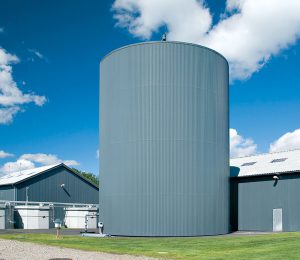An important factor in developing new technologies at the university is the link to private companies able to commercialize and bring them to market.
Claus Mortensen and Ole Trudslev
BioCycle February 2019
In its quest to prove that 100 percent renewable is doable, and since Denmark gets almost 50 percent of its electricity from renewable energy sources — and the security of supply is around 99.995 percent — Apple, Inc. chose Denmark as the ideal location for one of its European data centers. Located in Foulum near Viborg, the new data center is right next to Aarhus University’s Research Centre Foulum, home to one of the largest biogas research and development (R&D) facilities in the world.
As part of its billion dollar investment, Apple has funded R&D activities at the university. The goal is to supply the data center with biogas derived electricity from fuel cells at the university’s anaerobic digestion (AD) facility. The Danish company Xergi designed and built the biogas plant at Aarhus University in 2007. The AD facility has been used for experimental purposes and heating of the campus. Now, with Apple’s investment, the plant will increase its capacity, processing more than 85,000 tons of manure, deep litter, straw, grass, silage and food waste to produce 5 million cubic meters/year of biogas (176.6 million ft3).
Intersection Between Industry And Applied Research
Research at the Aarhus University digester includes testing and demonstration of new pretreatment systems, process optimization and power-to-gas technologies. Haldor Topsøe, a catalyst designer and manufacturer, has been doing research and demonstration on-site, leading to a subsequent precommercial field trial by University of Chicago spin-off Electrochaea LLC that demonstrated biocatalyst methanization. Xergi has conducted research on optimizing AD of biomass feedstocks that were considered difficult to handle, e.g, processing large quantities of straw and manure with bedding material, and large amounts of chicken litter. Today the company has improved these innovations, and implemented them in several large-scale commercial plants.
An important factor in developing new technologies at the university is the link to private companies able to commercialize and bring them to market. Innovations like these contribute to advancing the biogas industry and improving the efficiency of biogas plants. For example, Xergi is a partner in a recent research project on methanization, where methane yield from existing biomass is increased by converting the carbon dioxide content in biogas to methane by addition of hydrogen. This project is increasing the energy potential of a biogas plant without increasing volumes of biomass to be processed. The common denominator for these research projects is receipt of financial support from either the Danish government or the European Union.

The AD facility at Aarhus University, built by Xergi in 2007, is scaling up to manage 85,000 tons/year of mixed organics. Photo by Flemming Nielsen, Story2Media
In the future, high value products will be extracted from various biomass feedstocks as part of a biorefining process. Aarhus University currently separates organic meadow grass into a fiber and a liquid fraction. The protein rich liquid fraction is used for organic fodder for one-stomach animals like pigs; the fiber fraction can be used to feed cows or for biogas production. The expanded plant at Aarhus University also will showcase a new method that utilizes partially degassed digestate (removed from the digester before standard retention time is reached) from biogas plants to create storable fungal substrates for mushroom production.
Agro Business Park And Inbiom
Agro Business Park, an agri-environmental technology incubator and international business development organization, is located directly between Apple’s data center and Aarhus University. Throughout the last 18 years, Agro Business Park has helped Danish and foreign companies develop new solutions within biomass, biogas and the bioeconomy by facilitating cooperation between public and private stakeholders and securing financing for such partnerships.
As a part of the Danish government’s investment focus on green innovation and competitiveness, Agro Business Park has been asked to operate The Danish Innovation Network for Bio-resources (INBIOM). The innovation network is a public-private initiative that brings a wide range of stakeholders, from biogas production and cleaning to green protein and insect production.
A recent example is Biogas2020 — a biogas platform project where technology demonstration and knowledge sharing took place between 35 public and private partners from three Scandinavian countries. Included were an analysis and business case development of liquid natural gas (LNG) production at a plant with no access to the natural gas grid, biogas production based on straw pellets and organic residues from wastewater from a dairy, and an analysis of the potential for CNG in Danish marine traffic and certification of biogas for transport. Biogas2020 also analyzed the positive externalities by producing biogas from waste products, including use of food waste digestate.
With more than 1,500 members, including 750 companies and all Danish universities doing research within biogas, INBIOM is a good contact for American stakeholders interested in collaborating with Danish companies or universities. As part of the newly founded cross Atlantic biogas program Biogas Go Global (see sidebar on page 26), INBIOM and Agro Business Park will work to accelerate common research, development and demonstration partnerships between companies and universities from both countries to develop the biogas industry on both sides of the Atlantic.
Claus Mortensen is Project Manager at the Agro Business Park and The Danish Innovation Network for Bio-resources. Ole Trudslev is Business Development and Sales Manager at Xergi. He can be reached at cm@agropark.dk.












